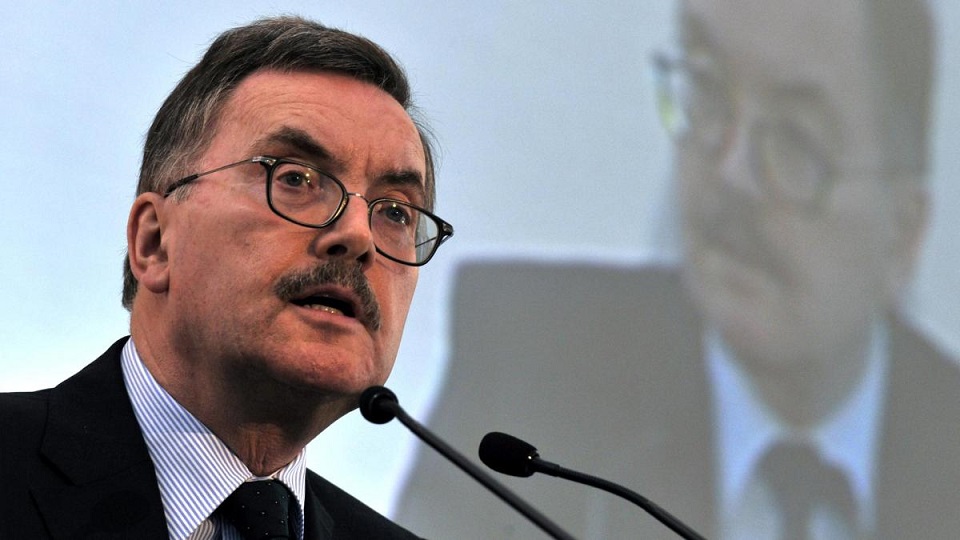Greece must not relax, warns influential German economist
Fiscal discipline is essential if country hopes not to find itself back where it was 10 years ago, says former Bundesbank VP and ECB board member

The German government believes that European fiscal rules “have proven their flexibility during the pandemic and that there is no need for fundamental changes,” the former vice president of the country’s Bundesbank and an ex-member of the European Central Bank’s executive board, Juergen Stark, tells Kathimerini, stressing that “fiscal discipline is indispensable.”
With regards to Greece in particular, he warns that there is no room to relax as the Greek debt will not be able to withstand another “severe economic shock.”
As far as the ECB is concerned, the respected German economist says that it is moving in “uncharted territory” with its current monetary policy, as “inflation is back, reducing the purchasing power of the euro and providing distorting signals to investors.”
Skyrocketing energy costs may trigger “stagflation,” Stark warns, saying that the problem stems from the fact that fossil fuel prices are growing without the cost of renewable energy going down.
On a more historical note, Stark says that the European South was inducted into the euro too soon, while adding that European support is allowing Greece one more opportunity to reform and balance its budget, so as to reduce its debt. Otherwise, he warns, “in 10 years from now it will be in a similar situation as it was 10 years ago.”
You are among the economists who see a high risk in the European Central Bank’s strategic choice to prolong the government bond purchases keeping interest rates low despite the rising inflation. What is the danger in practical terms? It should be noted that the ECB considers the inflationary pressures temporary.
I have criticized the ECB policy for many years already, because it has operated in crisis mode since 2008, irrespective of changing conditions and data, for instance in 2017-18. All in all, the ECB’s policy is based on a false diagnosis. Confronted with new challenges, the ECB has moved deeper and deeper into uncharted territory with negative interest rates and a ballooning balance sheet. With its bond-buying programs, the ECB has distorted bond markets. The interest rate, one of the most important prices in a market economy, has lost its signaling function. Now inflation is back, reducing the purchasing power of the euro and providing distorting signals to investors. I have never believed in the ECB’s argument of higher inflation being transitory. Already half a year ago I argued that inflation will become more broad-based with an increasing risk of being more persistent. Despite new uncertainties, risks and geopolitical challenges, in particular with [Russian President Vladimir] Putin’s war [on Ukraine], the ECB must react now in order to fight an emerging inflationary spiral.
‘The best way forward is for the Greek government to make use of the current situation, moving forward to more solid public finances, to reduce debt and to combine this approach with structural reforms’
Energy prices are skyrocketing, just as Europe is putting the “green” transition high on the agenda. What is the main reason for the surge in energy costs and to what extent do you think it could derail forecasts for the eurozone’s economic recovery?
There are many factors driving energy prices. Initially, the main factor has been the strong economic recovery after lockdowns in many regions of the world. The demand for energy, in particular oil and natural gas, has by far exceeded supply. Another important factor is the “green transformation.” It is becoming increasingly clear that this transformation will not be possible without a surge of inflation. Fossil-fuel energy sources should become more expensive to the same extent that renewable energy becomes cheaper through the expansion of the relevant capacities. The change in relative prices should alter the structure of demand while the overall price level remains stable. In fact, production capacities for fossil-fuel energy have fallen faster than new capacities for green energy could be created. As a result, oil and natural gas prices have risen without renewables prices falling accordingly to compensate. The most recent and most important factor driving energy prices is the fallout from Russia’s invasion of Ukraine, Europe’s high dependence on Russian oil and gas supply, and the increasing risk of being cut off from this supply chain. All these developments will dampen economic activity and may even trigger “stagflation.”
Greek debt comes to 200% of gross domestic product, an extremely high level. However, there is an argument that favorable repayment terms, according to the agreement with the eurozone, combined with the improved performance of the Greek economy will ensure solvency in the long term. What is your opinion?
Greece’s public debt at 200% of GDP is at the highest level within the euro area. But this figure is not fully comparable to the debt levels of other countries, because the ESM [European Stability Mechanism] is the largest creditor and provides very favorable financing conditions. There are also other European institutions, including the ECB via its PEP [Pandemic Emergency Purchasing] Program until the end of March 2022, financing, in part, Greek debt. Greece has a relatively favorable debt structure, including long maturity and low financing needs. But there are downside risks, in particular including the possible direct and indirect effects of Putin’s war on Greece’s economy and its fiscal position. In the medium term, Greek debt seems to be sustainable only if the economy is not hit by another severe economic shock. Then Greece again could depend on additional financial support from European institutions, if this support is politically agreed.
As far as long-term sustainability is concerned it is extremely difficult to make a credible and reliable assessment. Uncertainty is simply too high. Sustainability depends in particular on Greece’s capacity and political will to sustain high primary balances and stronger long-run growth. As a conclusion: there is no room for Greek authorities to relax and to simply rely on European support. The best way forward is for the Greek government to make use of the current situation, moving forward to more solid public finances, to reduce debt and to combine this approach with structural reforms. If Greece misses this opportunity, in 10 years from now it will be in a similar situation as it was 10 years ago.
The European South, and Greece especially, has been at the center of crises that have tested the cohesion of the eurozone. Of course, some also attribute errors to the prescription given to the patient. Do you think that, one way or another, substantial progress has been made in bringing the so-called “weak links” in line with the European average? Or have we just kicked the can down the road?
You will be surprised to hear from me that the euro area sovereign debt crisis could have been avoided. Why? For political reasons the single currency started with countries which really did not qualify and which would have been better off in sticking to their national currencies and to their domestic political tools for a longer period of time. Some member-states adopted the euro without living up to the conditions of a monetary union. They were neither politically, nor economically, nor institutionally mature for this historical step in 1998 or in the early 2000s. But meanwhile, the former crisis-countries are performing quite well economically and I do hope that all euro area member-states have learnt their respective lessons from past crises: (i) to keep public indebtedness under control, (ii) to go ahead with structural reforms and (iii) to strengthen public institutions. In my view the so-called “European South” should not expect all their still existing structural problems to be mitigated by more financial transfers from the northern countries, even as the economic and monetary union is moving towards a debt and liability union, which was never intended according to the provisions of the Maastricht Treaty. The discussed mutualization of debt and financial transfers will inevitably lead to more tensions between member-states. However, nobody knows what will happen next after Russia’s invasion of Ukraine. This has already triggered important political U-turns in setting new political priorities in some European countries, in particular in Germany.
Germany has a new finance minister, who comes from the liberal party. The new chancellor is a Social Democrat, in a governing coalition in which the Greens also participate. What changes do you think we will see in Germany’s economic policy? It should be noted that consultations on the fiscal rules in the eurozone are under way.
I still call it an interesting experiment that has started in Germany after the general elections in 2021. For the first time, three political parties with very different and in some aspects controversial programmatic approaches or ideologies formed a coalition government. The result was a series of compromises between the three political forces, laid down in the coalition agreement. The political priorities of the new government seemed to be pretty clear: (i) to overcome the pandemic, (ii) the green and digital transformation of the economy and (iii) the commitment to return to the fiscal rules at the national and supranational levels. However, being shocked by the war in Europe, which has destroyed some political illusions, a large part of the coalition agreement is obsolete now and the political agenda has been reset, with the main focus on foreign and security policies. Germany will finally fulfill its NATO commitment of 2% of its GDP for defense spending and will invest over the next couple of years additional 100 billion euros in military equipment. This may detract from “green transformation” expenditure, linked to a rethink on ending coal and nuclear energy. Concerning fiscal rules, the German government will stick to the national rule, enshrined in the constitution, and known as the “debt brake.” The government has stressed that the European fiscal rules have proven their flexibility during the pandemic and that there is no need for fundamental changes.
Fiscal rules are a crucial part of the institutional setup of monetary union, keeping in mind that historical monetary unions in Europe failed because of fiscal profligacy and a lack of discipline, among other factors. We need simple, credible and transparent rules which are enforceable. By the way, we started with a simple rule in 1998. But meanwhile, the rules have become overly complex, ineffective and intransparent, with too many exceptions. I understand, there is an ongoing discussion to rethink fiscal rules to allow for higher debt ratios, given the low interest rate environment and the need for more public investment. We should not forget that fiscal discipline is indispensable, as interest rates will not stay at zero or low levels in eternity. With higher interest rates public debt in some countries could become unsustainable. There are always cheap political excuses that make a return to solid public finances so difficult. But you can’t keep piling up more and more debt to meet new challenges, such as public investment, the green transformation and security and defense policy. Instead, a reprioritization of public spending is needed, which means to define political posteriorities.
What is the eurozone’s position in international competition today? What are the pros and cons for players like the United States and China?
Putin’s war, whatever the outcome will be, has a fundamental impact on the global political order with far reaching effects, among others on our living conditions, our wealth, our economies and on de-globalization. It is important for Europe to strengthen its political international role, to defend the model of the liberal democracy and to deepen integration, in particular in the field of foreign and security policies. But we must recognize that in contrast to the US and China, neither the EU nor the euro area is a state or a political superpower. European sovereignty and economic power are derived from the sovereignty and economic power of the member-states. In order to remain an important player in global politics or in the economic field – e.g. in economic performance, innovation and technology – the EU and its member-states have to encourage research, development and innovation, setting the right incentives for private investment in new technologies and to catch up with digitization. Furthermore, structural reforms and the completion of the single market are important ingredients to enhance economic strength. In the European and US market economies private investment is key. This is the big difference to China, which follows the economic model of state capitalism, with an intransparent mix of government or state-owned companies and private investment. European politicians are tempted to copy at least in part the Chinese model with more and more state interventions in the market, pursuing an ambitious European industrial policy. But this will lead to bad investment.
An economy cannot be managed like a firm. Neither the European Commission nor national governments, neither ministers nor officials know better than entrepreneurs, where and when to invest. It is understandable, however, to reduce the dependence of crucial imported products on a small number of global players. But security and resilience come at a cost. Products will become more expensive and wealth be lowered, because of the limitation of global division of labor.






